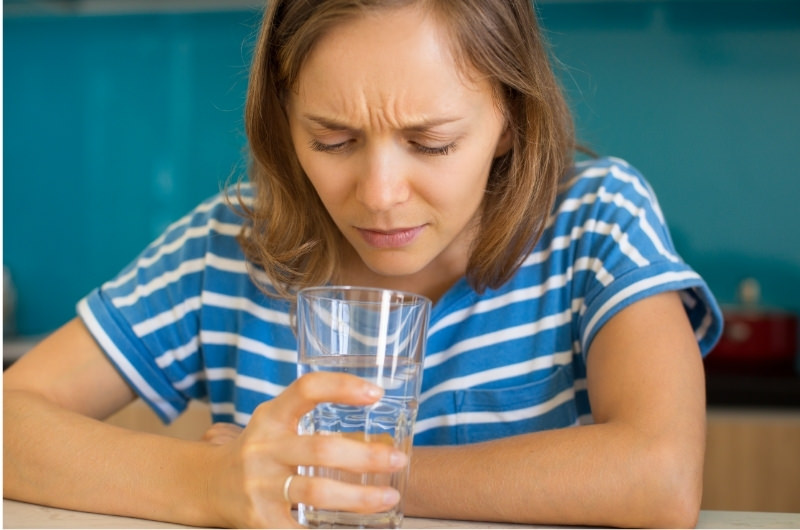If you’ve been feeling nauseous whenever you drink water, there could be a list of valid reasons behind it. The reason could be anything from drinking a lot of water on a full stomach or an empty stomach to drinking bacterial or pesticide-contaminated water. Finding out the cause and then solving the issue will help you not feel nauseated at all. You can even try drinking infused or carbonated water if flat water is too boring for you.
Water is an essential part of our life, and it’s generally recommended to consume 8-9 glasses of water a day to stay hydrated.
The body performs many functions when we drink enough water. While drinking water is as natural and effortless as breathing, if you’ve been having trouble lately and feeling nauseated, there are reasons behind why it’s happening.
Typically, you shouldn’t feel nauseated, but if you are, you’re doing something wrong, making you feel this way. So, let’s explore various reasons and try to rectify this situation.
Feeling nauseated
Nausea is a feeling when you get the urge to vomit, and the sense of unpleasantness is attached to it. It’s a sign that something is wrong with your body that needs to be solved as your body is in discomfort because of some issue.
Causes for nausea after drinking water
While you shouldn’t feel nauseated but if you do, then you’re doing something wrong. If you feel like throwing up after drinking a glass of water and can’t drink as much water as before, this might be because of various reasons.
If these issues are identified and solved, they can stop the feeling of nausea. Then you won’t have to face trouble drinking water at any time of the day.
1. Full stomach
It’s generally said not to drink water immediately after having a meal. Why do you think that is? It’s because you just ate, and now your stomach is probably full from the food. There isn’t any more space. On top of that, if you try to drink any water, it’s bound to overflow.
When you drink water on a full stomach, you will immediately feel nauseated as your stomach doesn’t have enough space to handle it anymore. With this will come the urge to vomit and expel excess out. Especially after a rich meal, avoid drinking any water immediately.
2. Empty stomach
The opposite is also true when trying to drink water. If you attempt to drink water on an empty stomach, then you might feel nauseated. When you have been hungry for quite some time, your stomach is already in knots, and many people feel nauseous or light-headed just from the hunger.
If you add a glass of water to it, it’s bound to worsen the situation. Your body is low on energy and hungry for food!
3. Bacteria water
How pure is your water? Do you use a water purifier? How do you know if your water is fit for drinking or not? Knowing if your water is contaminated or not is essential. For all you know, you have been drinking contaminated water, so you have been feeling nauseated for some time now.
If you use a water purifier, then you need to get it serviced. If it’s been a long time since you got it serviced last, then it might be causing issues with your water.
The way to test if you’re dealing with bacterial contamination is through testing. You can either send a sample to a laboratory or buy a test kit and analyze yourself.
4. Pesticides
Your drinking water could also be contaminated with a widely used pesticide called chlorpyrifos that can trigger nausea, headaches, and dizziness in low dosages.
It originates from agriculture as one of the main contributors to the pollution of our drinking water.
4. MTBE
MTBE is a toxic byproduct of petroleum refining served to millions of Americans between 2010 and 2015 in the form of contaminated tap water. It generated a foul odor making the water undrinkable.
It migrates through groundwater and doesn’t degrade quickly. This caused extensive groundwater contamination across the U.S., even forcing many public water providers to close drinking water wells. MTBE causes a person to feel nauseous, dizzy, headache and disorientated.
5. Dehydration
If you’ve been dehydrated for some reason and then rapidly run to drink a lot of water at once, you might feel nauseated. Staying away from water for a long time can also cause you to crave a lot of water at once, but you need to slow down and drink tiny amounts of water within intervals.
6. Electrolytes
You might even feel nauseated if your water doesn’t contain enough electrolytes. If you’re going to consume water, you also need to check if water quality isn’t depleted. Drinking water also fulfills other needs of our body too. We need enough electrolytes in our water, or it can also cause nausea.
7. A lot of water
You might want to change this habit of yours if you drink a lot of water in a short amount of time. Every human body works differently, and it’s essential to know how your work. You might be someone who will do better if they consume a small amount of water at a time.
The same thing happens with me, as I am one of those people who can’t bear to drink a full glass of water at a time. For this reason, I keep a bottle at my desk and keep sipping a small amount of water in between. The bottle helps me keep in check how many liters of water I drink in a day.
Ways to get rid of nausea

As we dived deeper into issues that might be causing this possible feeling of nausea in you lately, it’s time to check on how to solve these issues.
- Taking small sips of water at intervals is a good idea for those who can’t drink a lot of water at once.
- Maybe switch your drinking water with infused or flavored water. You can even make homemade infused water.
- Always eat a little before drinking water. Avoid drinking lots of water on an empty stomach.
- If you’ve had a heavy meal, then also avoid drinking lots of water immediately after it. A sip or two is fine, but if you want to drink more, wait for 30 minutes. During that time, some of your food might be settled so you wouldn’t feel so nauseous when drinking water.
- Sometimes you might get bored from drinking water, or you might want to switch things up. There are plenty of fruits that can work to keep you hydrated, such as watermelon. They have plenty of vitamins, minerals, and antioxidants.
- Some people also prefer carbonated water as they feel flat water doesn’t work for them.
- You can also change the temperature of the water and see which one doesn’t make you feel nauseated.
FAQs
Should I drink water if I feel like throwing up?
If you’re vomiting, then you need to take a break from eating solid foods. Anything heavy or rich diet is a total no-no for the time being. Instead, focus on being hydrated and drink cold water to calm down.
Don’t drink too much water at once, but small sips in intervals would be better. Avoid anything carbonated and sports drink.
Can drinking a lot of water make you nauseous?
Dehydration and overhydration are both terrible for your body. When you overhydrate yourself, you are putting pressure on your kidneys.
With too much liquid, they can’t remove excess liquid. It starts collecting in the body, leading to nausea, vomiting, and diarrhea. You might even have a headache.
Is drinking water at night bad for you?
Drinking water just before your bedtime is acceptable if consumed in limitation. If you drink too much water, your body will interrupt your sleep cycle. As of now, it has to work to remove excess liquid. So, keep your water level balanced throughout the day instead of intaking a lot of it at night.
Is it good to drink water after waking up?
Drinking a glass of water after waking up is beneficial to your body in many ways. All those hours of sleeping must have made your body’s level of water low, plus drinking water will help you begin bowel movement and wake you up instantly.
Should I drink cold or warm water in the morning?
It’s beneficial to drink warm rather than cold water. Your body has to work extra hard on bringing down the temperature of cold water. In contrast, warm water is helpful for your digestive system and helps in bowel movement. It keeps your body balanced and promotes the body’s persistence by applying all its functions.
To summarize
Drinking water can make you feel nauseated due to various reasons. There could be a couple of things you’re doing wrong, like drinking too much water on a full stomach or other things such as drinking contaminated water without being aware of it.
Drinking water shouldn’t make you feel nauseated, and if it does, you need to find out the root cause and try to rectify it. Also, bringing some much-needed changes in your lifestyle can help you become more aware and keep your body healthy. In fact, the first thing you should do from the following day onwards is drinking warm water for a month and then notice the changes!


